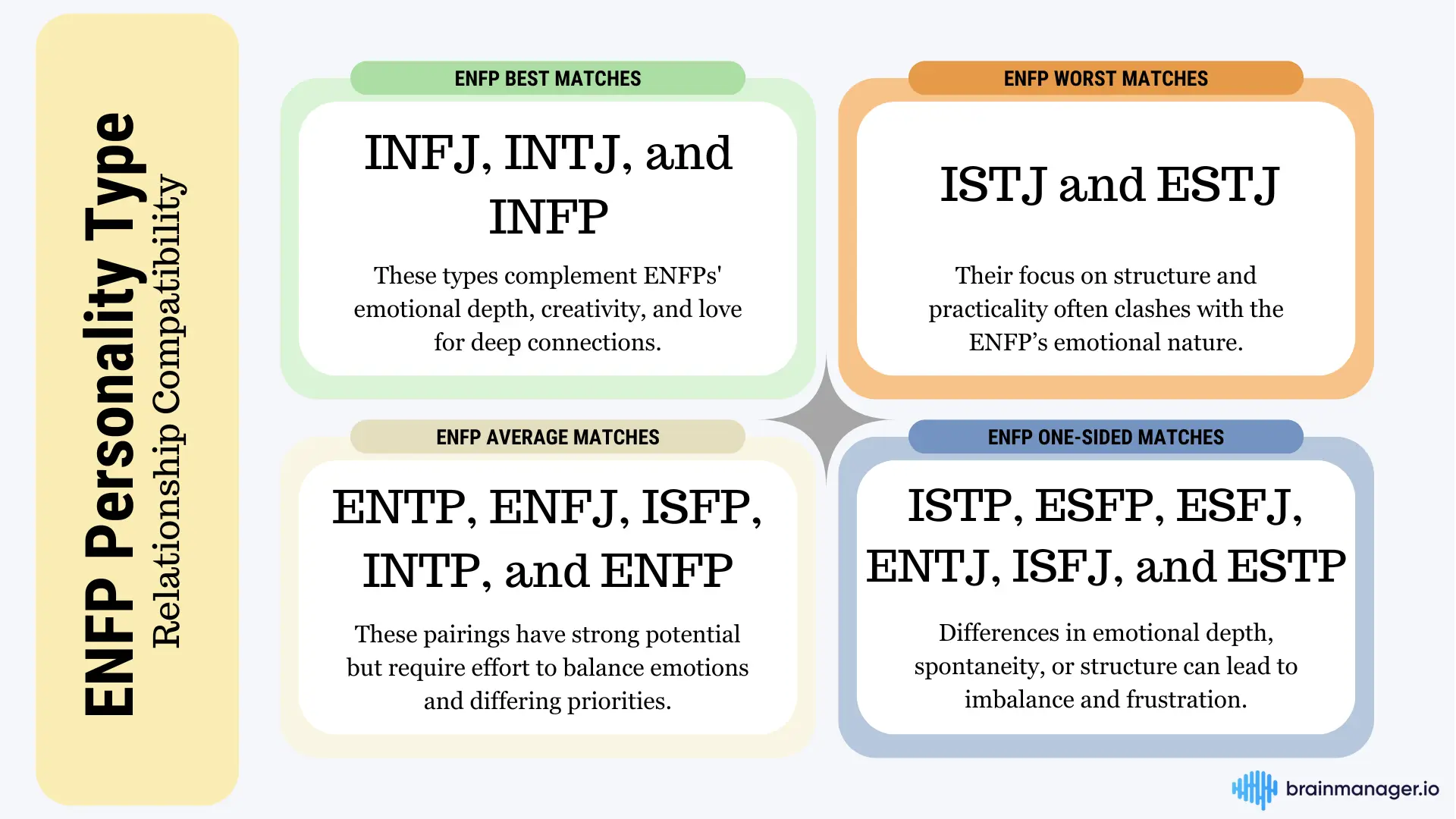Who is Compatible With an ENFP’s Energy, Passion, and Love for the Unexpected?
Wondering who’s the best match for an ENFP? This fun and insightful guide breaks down ENFP compatibility — from soulmates to the trickiest pairings. Find out who brings out their adventurous, creative side and who might struggle to keep up!


Back
11 mins read
ENFPs, or the “Campaigners,” are often described as warm, enthusiastic, and creative individuals. They are known for connecting with others deeply and bringing energy and excitement into any situation.
However, a relationship with an ENFP can sometimes be a rollercoaster ride, especially for those who thrive on emotional connections and intellectual stimulation like ENFPs. Their spontaneity and need for constant excitement may be exciting and invigorating, but it can also clash with their partner's desire for stability and routine. Thus, understanding the compatibility and needs of an ENFP in a relationship is so important before diving in.
So, who is the most compatible and least compatible match for an ENFP?
When it comes to relationships, ENFPs are often best matched with INFJ, INTJ, and INFP types, as these pairings foster deep emotional connections, intellectual stimulation, and shared values. On the other hand, ENFPs might find it challenging to connect with ISTJ and ESTJ types due to differences in values and lifestyle preferences.
ENFP Compatibility Chart

Before delving into a detailed analysis of all possible pairings with ENFPs, we’ve included an ENFP compatibility chart below to give you a clear overview of ENFP compatibility.
This chart visually categorizes each of the 16 possible pairings, highlighting the best matches, average matches, those that may require more effort, and even one-sided ones. Use this chart as a quick reference to see where different types fall in compatibility with ENFPs.

Now that you have a general overview of ENFP compatibility, let's dive into the details.
ENFP Relationship Compatibility
How an ENFP presents and operates in relationships largely depends on their stage of personality type development.
In Jungian typology, ENFPs' dominant function is Extraverted Intuition (Ne). They also have Introverted Feeling (Fi) as their secondary function and a Perceiving orientation toward the external world.
So, how does this all translate into relationships?
Typically, our natural attraction to people who share our dominant function yet use it in a different direction works very well for us.
We don't just flip-flop the Introverted and Extraverted traits; we also flip-flop the Judging and Perceiving traits. In this way, the partners we're attracted to will have a different approach to dealing with the world. This means an ENFP's dominant function pairs naturally with people who share their Intuition trait but use it more Introvertedly.
Outside of natural pairing partners, it's important for an ENFP type to partner with someone who respects their sense of adventure and desire to explore new ideas and experiences. And if this doesn't happen, there may be tension in the relationship.
For instance, the dominant Introverted Sensing types may find the ENFP's constant desire for change and adventure irresponsible and impractical, while ENFPs may find the Sensor's "by the book" adherence to tried-and-true methods limiting and stifling.
To a lesser degree, the dominant Extraverted Sensing types might also pose a challenge for ENFPs even though they’re likely to appreciate each other's gusto and love for life. In other words, ENFPs get along better with Intuitive types than Sensors.
The Judging/Perceiving difference can also significantly influence relationships, especially if both individuals are dominant Extraverted Judgers, who are known to be the most controlling among all personality types. Ideally, ENFPs do not like to be controlled, so they are likely to butt heads with Extraverted Judgers.
Early in their type development, ENFPs might be drawn to the stability and consistency of Sensing Judging types because they outwardly embody the ENFP's inferior function (Si). However, while such relationships can be satisfying later in life after years of growth and effort, they often prove unsatisfying in younger years once the initial infatuation has worn off.
ENFPs may also find an attraction to SP types who share a love for outer novelty. However, ENFPs, as Intuitives, seek deeper exploration of meanings and ideas, while SPs (especially ESPs) focus more on actions, sensations, and appearances.
This fundamental difference can lead to frustration for both types, with ENFPs desiring more meaningful conversation and SPs seeking more physical action or sensory stimulation.
ENFP and Other Personality Types Compatibility

Let’s delve into ENFP compatibility with other personality types — who’s their ideal match?
ENFP Soulmates: Best Matches
1. ENFP and INFJ Compatibility
Both Intuitive Feelers, ENFPs, and INFJs, complement each other perfectly. They share the same value system, creativity, and boundless curiosity, yet their different approaches complement each other. The ENFP’s dominant extraversion function can help an INFJ exit their inner shell and develop a more external sense of confidence.
Conversely, INFJs can leverage their inner compass and decisive judgment to guide ENFPs in deep introspection, providing the necessary framework for boosting their self-esteem and accomplishing their goals externally.
Despite their natural compatibility, one should be careful with planning and spontaneity. People with INFJ personalities love to plan, while those with ENFP personalities prefer to go with the flow. Always be flexible and try to create loose blueprints and schedules.
2. ENFP and INFP Compatibility
Interestingly, the minds and hearts of the INFP and ENFP function very similarly. They’re both spontaneous and tend to prioritize emotional connections and genuine relationships over superficial small talk. They are also highly intuitive and empathetic and share a fundamental desire to be understood.
In terms of compatibility, an INFP and ENFP relationship will feel dreamy and romantic, even in hard times. However, since both types are Intuitive Feelers and neither get along well with the judgment trait, always be careful with criticism. Keep your feedback constructive, and be hyper-aware of your language when handling conflicts.
3. ENFP and INTJ Compatibility
INTJs can appreciate that the bubbly playfulness of ENFPs is a refreshing change of pace, while ENFPs can benefit from the calm, collected, and analytical mind of INTJs.
INTJs are Thinkers, not Feelers, so they can help teach ENFPs how to make decisions based on logic rather than emotions, while ENFPs can remind INTJs to let loose and have fun sometimes. These two personalities balance each other well and can make a complementary pair in a relationship.
If you’re in a relationship with an INTJ as an ENFP or vice versa, learn to communicate your needs effectively so the ENFP doesn’t misinterpret the INTJ’s need for space as a rejection and the INTJ doesn’t feel overwhelmed by ENFP's constant need for social interaction.
ENFPs Least Compatible: Worst Matches
4. ENFP and ESTJ Compatibility
Both ENFP and ESTJ are strong-willed individuals who may struggle to see eye-to-eye because of their dominant personalities. ESTJs tend to be more structured and focus on external accomplishments, while ENFPs prioritize emotional achievements over practical ones and thrive when things are fluid.
To make it work, ENFPs can help ESTJs loosen up and use their intuitive mind as much as their analytical mind, while ESTJs can help ENFPs establish a more goal-oriented approach to their ideas and plans.
5. ENFP and ISTJ Compatibility
While the opposite can attract, ISTJs and ENFPs may have a tough time bonding due to their conflicting interests. Introverted, sensing, thinking, and Judging, ISTJs love to plan and focus on the day-to-day, while ENFPs are more spontaneous and love to dream big.
How can they make it work? ISTJs can benefit from the enthusiasm and creativity of ENFPs, while ENFPs can learn to appreciate the stability and structure that ISTJs provide.
Average ENFP Matches, But not Ideal
6. ENFP and ENFJ Compatibility
While not the best matches, ENFJ and ENFP relationships can still work with effort and understanding. ENFJs are highly empathetic and strongly emphasize harmony, while ENFPs value freedom and independence.
Regardless, both types can benefit from open communication and compromise. ENFJs should try to understand and respect the need for space in their ENFP partner, while ENFPs should recognize the importance of considering others' feelings in decision-making processes.
7. ENFP and ENFP Compatibility
ENFPs often gravitate towards other ENFPs as they share similar personalities. Their similar communication styles make it easier for them to work through disconnects, and they likely have mutual interests, which allows them to bond and create shared experiences. However, their emotional intensity can lead to conflicts if not managed properly.
Both personality types must be careful with individuality to make this relationship work. Since both types are extroverted, they will need to set boundaries and communicate openly about their needs and desires.
They should also be aware of the potential for competition between two strong-willed individuals and strive for compromise rather than trying to overpower each other.
8. ENFP and ENTP Compatibility
ENTPs and ENFPs share the same dominant function of Extraverted Intuition, which makes their relationship highly dynamic and full of ideas and possibilities. Both types are creative, innovative thinkers who thrive on brainstorming and exploring new concepts.
Their shared Intuition also means they can easily understand each other's abstract thinking processes and bounce ideas off each other. This allows for a deep level of connection and understanding in their conversations.
However, their differences lie in their one shared difference (Thinking vs Feeling) and their opposite functions. But despite these potential challenges, ENTP can help ENFPs see through their biases and look at things objectively, while ENFP can help ENTP get in touch with their own feelings and emotions.
9. ENFP and INTP Compatibility
ENFP and INTP make a brilliant match (literally). They are intuitive and spontaneous, meaning they love learning new things and exploring new ideas. INTPs will benefit from ENFPs’ social buoyancy and charisma, while ENFPs will be enthralled by INTPs’ logical thinking and no-nonsense attitude.
The challenge for this pairing is that they are both intuitive and flighty. Thus, it can be easy for them to neglect the everyday practicalities of life to the point where basic needs are not met.
The best way to make it click is for both individuals to stay on top of themselves and each other by avoiding procrastination and setting clear, achievable goals.
10. ENFP and ISFP Compatibility
As Sensor-Intuitive pairs, these two types don’t see the world the same way. The ISFPs are Sensors, meaning they’re not interested in abstract ideas. This approach, however, can help a person with an ENFP personality to get their head out of the clouds and be more present.
Meanwhile, the extraversion and optimistic nature of ENFPs can help ISFPs look at the bright side and embrace new experiences. Overall, being equally flexible and empathetic, ISFPs and ENFPs can make a harmonious duo with the right amount of work.
One-Sided ENFP Matches
11. ENFP and ENTJ Compatibility
As Judging-Perceiving pairs, these two types have many differences in how they approach life. ENTJs are very structured and organized, while ENFPs tend to be more spontaneous. However, both share a love for learning and exploring new ideas. With the right balance of planning and spontaneity, this combo can work well together.
12. ENFP and ESFJ Compatibility
Relationship compatibility between ESFJs and ENFPs can sometimes feel one-sided due to their differing cognitive functions. The difference between ESFJs’ Extraverted Feeling (Fe) and ENFPs’ Extraverted Intuition (Ne) means ESFJs often focus on immediate emotional needs and stability, while ENFPs may seem more interested in exploring new ideas and opportunities.
This can make the ESFJ feel neglected or misunderstood. The dynamic requires conscious effort from both sides to bridge their cognitive differences and find mutual understanding.
13. ENFP and ESFP Compatibility
Besides their differing cognitive emphases, their differing approaches to life and relationships can make the compatibility between ESFP and ENFP personalities appear one-sided.
While both types are extroverts and share a love for excitement and spontaneity, ESFPs tend to live more in the present moment, focusing on immediate experiences and sensory pleasures. In contrast, ENFPs are more future-oriented, driven by abstract possibilities and deeper meanings.
This fundamental difference can create an imbalance, with ENFPs potentially feeling a lack of depth or long-term vision in the relationship. At the same time, ESFPs may find their partner's idealistic nature somewhat impractical. Bridging this gap to create a more balanced and mutually fulfilling connection is the challenge.
14. ENFP and ESTP Compatibility
While ESTP and ENFP personalities are energetic and spontaneous, ESTPs focus on concrete experiences and immediate gratification, whereas ENFPs thrive on emotional connections and future possibilities.
This disparity can lead to misunderstandings and frustration, with ESTPs finding ENFPs' idealism impractical, and ENFPs might perceive ESTPs as lacking depth or vision.
Moreover, their differing communication styles and values can create challenges in maintaining a balanced relationship. Despite the initial attraction, these differences often result in one partner feeling more satisfied or understood than the other.
15. ENFP and ISFJ Compatibility
Typically, the ISFJs are driven by Introverted Sensing (Si) and Extraverted Feeling (Fe), which makes them detail-oriented, routine-loving, and deeply empathetic. They value stability and tend to focus on past experiences and traditions.
However, the ENFPs’ Extraverted Intuition function can make ISFJs feel overwhelmed and unsupported. This fundamental difference in cognitive processing can lead to misunderstandings and imbalances, causing the ISFJ to feel like they are giving more than they receive in the relationship.
16. ENFP and ISTP Compatibility
The stark contrast in their cognitive functions can lead to differences in ISTP and ENFP preferences in a relationship. The ISTPs are more likely to prioritize their Introverted Thinking and Extroverted Sensing, which drives them to seek practical solutions and engage directly with their environment.
This approach can make them appear emotionally distant or unresponsive to their partner's needs. Their focus on logic and immediate realities may also leave little room for addressing emotional complexities, contributing to a dynamic where the ISTP's practical, straightforward nature can overshadow the emotional and intuitive aspects their partner may seek in the relationship.
What ENFPs Look for in a Relationship

ENFPs are characterized by their love for adventure, exploration, and novelty in their external environment and inner worlds.
They seek partners who can share these passions with them and who can match their enthusiasm and willingness to explore new ideas and experiences. In summary, the core desires and values that ENFPs look for in a relationship are:
- Emotional connection and understanding
- Intellectual stimulation and deep conversations
- Adventure and spontaneity
- Authenticity and depth in their partner
- Compatibility and mutual support
- Open-mindedness and acceptance
- Intellectual stimulation
Relationship Turn-Offs for ENFPs
Every personality type has its turn-offs, and ENFPs are no exception. They value their freedom and individuality, so any behavior threatening these aspects can quickly turn them off. Some common relationship behaviors that can be a major red flag for an ENFP are:
- Controlling or dominating behavior
- Routine and predictability
- Being overly critical or judgmental
- Lack of growth and intellectual stimulation
- Dishonesty and lack of authenticity
- Insecurity and neediness
- Closed-mindedness and unwillingness to try new things
ENFP Relationship Strengths and Challenges

Like all personality types, ENFPs have their set of strengths and weaknesses that can manifest in relationships. Here are a few to keep in mind:
Strengths
- Highly empathetic and emotionally intelligent
- Have a creative and inspiring energy
- Are adaptable and open to change
- Authentic
Weaknesses
- Struggle with routine and consistency
- Tendency to overlook red flags in the early stages of a relationship
- Impulsive in decision-making
- Tendency to overcommit or idealize partners
- May become bored easily
- Sensitivity to criticism and conflict
- Constant quest for the perfect relationship may make them change relationships frequently
What ENFPs Are Like in a Relationship

Compatibility in romantic relationships, children, and friendship perspectives is also important to ENFPs, as it is in most relationships Let’s take a look at what ENFPs are like as lovers, friends, and parents.
1. ENFP as a Lover
Champions are warm, loving, and emotionally engaged partners. They are expressive with their feelings and want their mates to share openly with them.
Creativity is a hallmark of the ENFP personality type. They are always coming up with new ways to bring excitement and joy to the relationship. Their love language is not tied to material things but to meaningful gestures and experiences showing their partner how much they care.
They also place value on personal development. They are the kind that would encourage their partner to pursue their dreams and want the same encouragement in return.
In conflict situations, ENFPs are likely to withdraw rather than engage in a difficult discussion. They are also flexible and supportive and would instead find original ways to compromise than butt heads.
Despite all these ticks, ENFPs can sometimes be unpredictable. While they may seem unreliable, they often show great responsiveness when a partner is emotionally distressed. They may also struggle with commitment and fear losing their freedom and individuality in a long-term relationship.
They also tend to idealize their partners and ignore potential red flags in the early stages of a relationship. They may overlook important compatibility issues in favor of maintaining their shared connection.
2. ENFPs as Parents
As parents, ENFPs are creative and devoted. They love to play and explore with their children, encouraging them to be curious and embracing their individuality. They are also warm and get the most joy from parenting when they have a secure attachment and connect emotionally with their children.
However, as passionate as they are about their ideas about correct behavior, they can also be inconsistent in enforcing strong discipline. They value close relationships with their children above all else and may avoid discipline for fear of losing that bond.
ENFP parents also seem to tire very quickly when subjected to mundane chores and demands from their children.
3. ENFPs in Friendships
With their natural vivacity, ENFPs are effortlessly sociable, which is why many celebrities have this personality type. They naturally make friends wherever they go, and they use their excellent communication skills and creative charisma to draw in an exciting and diverse social circle.
As friends, ENFPs are supportive and uplifting, always ready for a little lighthearted banter — or a deep, heartfelt conversation about anything and everything. They are good at making their friends feel seen, appreciated, and valued.
At times, however, they become suspicious that they are being taken advantage of or that their friends do not care about them. This suspicion makes them feel more than a little lonely. Their tendency to prioritize new experiences over routine tasks may also sometimes lead them to neglect to maintain friendships.
Your ENFP Love Match: The Perfect Ending

ENFP relationships can be rewarding because ENFPs can connect deeply and create a strong emotional bond with their partners. They desire a relationship that is both meaningful and exciting and will put in the effort to see their partner grow and achieve their life’s goals.
Despite some dating problems that may arise, ENFP relationships can be healthy and fulfilling. If you want a successful relationship with an ENFP, you should be at least willing to respect their individuality and try to understand their unique perspectives.


Return to Blog







